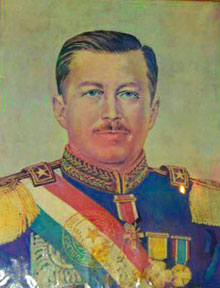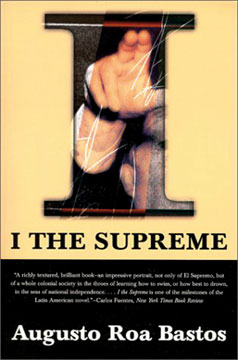Dictator novels and the Latin American Boom genre
 Throughout the 20th Century, the 'Dictator novel' has been extremely
influential in the development of Latin American literary tradition.
Many authors rejected traditional story-telling techniques and developed
an unusual style. This blurred the distinctions between reader,
narrator, plot, characters and the story itself. In addition to
examining the authority of leadership, the authors assessed their own
role as paternalistic dispensers of wisdom, seeing it as akin to the
dictatorships they were challenging. Throughout the 20th Century, the 'Dictator novel' has been extremely
influential in the development of Latin American literary tradition.
Many authors rejected traditional story-telling techniques and developed
an unusual style. This blurred the distinctions between reader,
narrator, plot, characters and the story itself. In addition to
examining the authority of leadership, the authors assessed their own
role as paternalistic dispensers of wisdom, seeing it as akin to the
dictatorships they were challenging.
Latin American countries have often been subject to both right and
left-wing authoritarian regimes. These have resulted from a history of
colonialism in which one group dominated another. It is therefore
unsurprising that there have been so many novels about individual
dictators and about the problems of dictatorships. Racial conflict
sometimes produces a figure of absolute authority who rises up to quash
or contain the racial tension.
Often this authority figure becomes a dictator. Seeking unlimited
power, the individual amends constitutions and dismantles laws which
would normally prevent reelection. General Manuel Estrada Cabrera, for
example, altered the Guatemalan Constitution in 1899 to permit his
return to power.
 |
|
Agosto Pinochet in
Chile- |
The dictators who have become the focus of the dictator novel (Augusto
Roa Bastos's "I, the Supreme', for instance, is based on Paraguay's
dictator of the early nineteenth century, the so-called Dr Francia) do
not differ much from each other in terms of how they govern. Their
tactics include exiling or imprisoning their opposition, attacking the
freedom of the press, creating a centralized government backed by a
powerful military force and assuming control over free thought. Despite
intense criticism levelled at these figures, dictators involved in
nationalist movements developed three simple truths. These were a) that
everybody belonged b) that the benefits of progress should be shared and
c) that industrial development should be the priority. Epitácio Pessoa,
who was elected President of Brazil in 1919, wanted to make the country
progress regardless of whether or not Congress passed the laws he
proposed. In particular, during the Great Depression of the 1930s, Latin
American activist governments saw the end of neocolonialism and the
infusion of nationalist movements throughout Latin America. This
increased the success of import substitution industrialization (ISI).
The collapse of international trade meant local Latin American
manufacturers could fill the market niches left vacant by vanishing
exports. This made the countries less vulnerable to that which their
leaders saw as ' 'foreign interference' since they perceived themselves
as independent and self-sufficient.
In the twentieth century, prominent Latin American dictators included
the Somoza dynasty in Nicaragua, Alfredo Stroessner in Paraguay and
Augusto Pinochet in Chile. United States interference in Latin American
politics is controversial and has often been severely criticized. As
García Calderon noted as far back as 1925: "Does it want peace or is it
controlled by certain interests?" As a theme in the dictator novel, the
link between U.S. imperialism and the power of the dictator is very
important. Dictators in Latin America have accepted military and
financial support from the United States but have then turned against
them later, using anti-American campaigning to gain favour with the
people.
'Yo el supremo' is a historical, fictionalized account of the
nineteenth-century Paraguayan dictator 'Dr Francia'. The book's title
derives from the fact that Francia referred to himself as "El Supremo"
or "The Supreme." The first in a long line of dictators, the Supreme was
a severe, calculating despot. The central themes of the novel are power,
language and the relation between the two of them. The Supremo believes
himself to be above all power and history: "I don't write history. I
make it. I can remake it as I please, adjusting, stressing, enriching
its meaning and truth." Yet this assertion is constantly challenged by
the very fact that while he achieves power by means of writing and
dictating, these very same methods can be used by others to dispute his
authority. Not even his own identity, represented by the personal
pronoun I, is safe and can easily be usurped as is demonstrated by the
incident of the pasquinade (parody). Language, as powerful as it is, can
never be controlled and can be used both as an instrument of coercion or
as an instrument of resistance.
 |
|
Alfredo Stoessner in
Paraguay |
During the time the book was written, Paraguay was under the
dictatorship of Alfredo Stroessner, who went on to rule the country even
longer than 'Dr Francia' did. Many consider the book to be at least in
part a thinly disguised attack on Stroessner who used methods similar to
Francia's to achieve and maintain the effective control of the country,
including the swift elimination of opposition, the employment of torture
and intolerance of dissent.
The writers of the dictator novel genre combined narrative strategies
of both modern and postmodern writing. Postmodern techniques,
(constructed largely in the late 1960s and 1970s), included use of
interior monologues, stream of consciousness, fragmentation, varying
narrative points of view, neologisms, innovative narrative strategies
and frequent lack of causality.
Alejo Carpentier, a Boom writer and contributor to the dictator novel
genre pioneered what is referred to as magical realism. However, the use
of this technique is not necessarily a prerequisite of the dictator
novel, as there are many that do not use magical realism.
A predominant theme of the dictator novel is obviously power, which
according to literary critic Michael Valdez Moses, in his 2002 review of
'Feast of the Goat', is linked to the theme of dictatorship. "The
enduring power of the Latin American dictator novel had everything to do
with the enduring power of Latin American dictators". As novels like 'El
Señor Presidente' became more well-known, they were read as ambitious
political statements, denouncing the authority of dictators in Latin
America.
As political statements, dictator novel authors challenged
dictatorial power, creating a link between power and writing through the
force wielded by their pen. The novel 'I, The Supreme', revolves around
a central theme of language and the power inherent in all of its forms,
a power that is often only present in the deconstruction of
communication. González Echevarría argued that: " Dr. Francia's constant
worry about writing all stem from the fact that he has found and used
the power implicit in language itself.
The Supremo defines power as being able to do through others what we
are unable to do ourselves: language, being separate from what it
designates, is the very embodiment of power, for things act and mean
through it without ceasing to be themselves. Dr. Francia also realizes
that he cannot control language, (particularly written language), that
it has a life of its own that threatens him".
Another constant theme which runs throughout the Latin American
dictator novel, is the interdependence of the Latin American dictator
and United States imperialism.
In Mario Vargas Llosa's 'The Feast of the Goat', for example,
Trujillo faces serious opposition shortly after losing his material
backing from the CIA, previously held for over 32 years in lieu of his
anti-communist leanings.
Gender is an additional overarching theme within dictator novels.
National portraits in Latin America often insist on the importance of
men and women that are healthy, happy, productive, and patriotic.
 |
|
I The Supreme |
Yet many national literary treasures reflect government rhetoric in
the way they code active citizenship as male. Masculinity is an enduring
motif in the dictator novel. There is a connection between the pen and
masculine power in Latin American fiction, but this pattern cannot be
explained by machismo alone, since it is far more complex.
Where we find violent, misogynistic fantasies of masculinity, we also
see violent social relations between actual men and women. Many Latin
American works include characters who act out violent masculinity, yet
their narrative structure provides readers with alternative responses to
misogynistic fantasies of masculine identity formation.
While it is difficult to exactly pinpoint the origin of the dictator
novel, its influence spans Latin American literature. Written largely in
the middle of the twentieth century, these novels followed a unique
style, employing many of the techniques of the "new" novel. As
previously discussed in this series of columns, the "new novel" rejected
the formal structure of conventional realism. Regional issues gave way
to universal ones and an ordered world view gave way to a fragmented,
distorted or fantastic narrative in which the reader no longer took a
passive role.
The role of the author was examined as the etymological link between
"author" and "authority" was established, and the figure of the author
became highly important. The authors themselves then questioned the
traditional role of the author as a "privileged, paternal figure, as the
authoritative 'divine creator' in whom meaning would be seen to
originate" and who seemed to fulfil the role of dictator.
These authors defined the novel in a new nontraditional way and
forced readers to examine the way in which social and political matters
affect their daily lives. In addition to examining the authority of
leadership, the authors assessed their own role as paternalistic
dispensers of wisdom, seeing it as akin to the dictatorships they were
challenging. This was undoubtedly a principle factor behind the new
narrative style that we have been studying.
|

